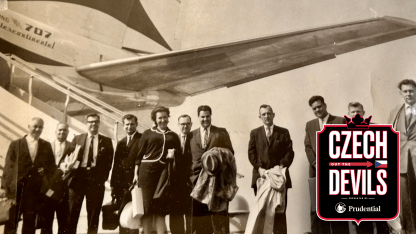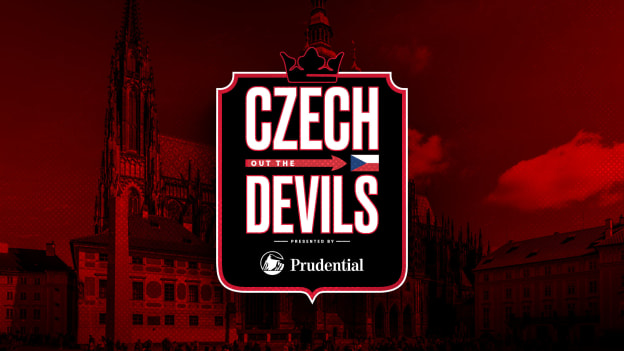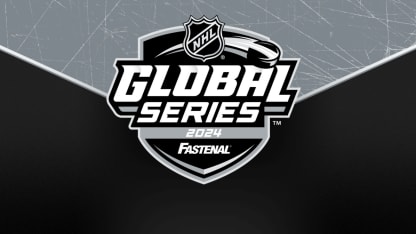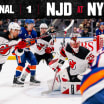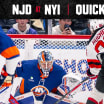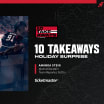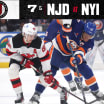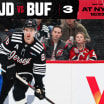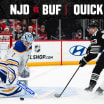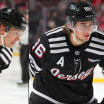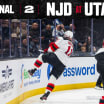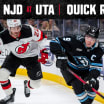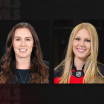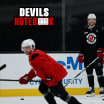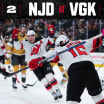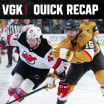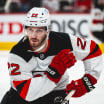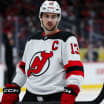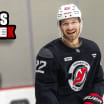But right up until the final day, we had to await the green light on our visas - it really looked like our trip would be cancelled before it started - and then sped to JFK to catch the flight.
Once we arrived in Prague, the Czech officials learned that I had been writing hockey for seven years. Before I even had time to unpack, I received an invitation to come and see a major Czech league hockey game.
Wow! I was amazed and excited. Mind you, I knew very little about Czech hockey other than that one of the country's best tennis players, Jaroslav Drobny, also had been the Gordie Howe of the country's stickhandlers. Which is another way of saying everything
that I'd be seeing - and hearing - would be like taking a graduate course in Czech Hockey 101.
Fortunately, my Czech guide spoke impeccable English and when we met he encouraged me to ask him any questions that I had. My first question was this: "It's late September, has your season started already?"
The answer was "No." We were going to see a preseason exhibition game of two of the top teams and we'd be watching from the biggest hockey arena in the country.
Before we got there, I couldn't help but wonder how Czech hockey compared to the then six-team NHL and how different the style of play would be compared to what I had been accustomed to at Madison Square Garden, Boston Garden, The Montreal Forum and Maple Leaf Gardens where I had been covering games.
Once we arrived, I kept being impressed by one after another. "You'll like our arena," my guide asserted. And he was right. It was not gigantic like Chicago Stadium, but it was reminiscent of the Forum, not gigantic but about 12,000 seat capacity.
And it was filled to capacity. "Where am I going to sit?" I timidly asked.
"You're a journalist," my guide shot back, "so you deserve to sit in the press box. In fact, you will be surprised by who will be sitting next to you."
Needless to say, I had no idea what the surprise would be until he introduced me to the game's play-by-play guy - Prague's version of Bill Spaulding - who, like myself, was eagerly awaiting the arrival of the rival teams on the ice.
Mind you, this was 1961 not 2024, so what I was viewing would be considered old-fashioned by today's standards. For starters, neither goalie wore a mask and the pads looked like they'd been shipped from Pop Kenesky's Hamitlon, Ontario factory; same as all NHL goalies of that era.
Helmets weren't mandatory so there were plenty of bareheaded skaters on what was a wider, Olympic-sized rink. As for the game itself, let me just say that the quality of play - not to mention the I.Q. or Intensity Quotient - was NHL quality.
Put it this way; I would come back and watch these guys any day or night. Or to put it another way, this was de luxe hockey; definitely not top-flight NHL quality but certainly on an American Hockey League level.
Of course, I couldn't understand the play-by-play guy's Czech descriptions but there was no mistaking the gripping broadcast calls as well calling the goals with HE SHOOTS! HE SCORES!! in Czech.
I went into the arena not knowing what to expect and I exited more impressed with the 1961 edition of Czech hockey than I had expected.
Frankly, I didn't expect to make a second trip to Czechoslovakia but, amazingly, the same fellow who set up my first trip came through again in 1965; the difference being that it was summer time and the Iron Curtain was not as thick in Prague as I thought it would be.
As a matter of fact, I was to learn vis two journalists, Pavel Kriz and Jiri Janovsky, that there had been, as it proved to be, a brief relaxation on the political front.
I should have mentioned earlier that my grandparents on my mother's side of the family originally lived in a town in Slovakia while it still was part of Czechoslovakia.
My grandparents emigrated to America in 1887 but in 1961 - when I first visited - they still were alive and gave me a bit of history.
On my return trip in 1965, I travelled alone but had a guide to help me along. He knew about my hockey background but what he didn't know was that this time I was on a secret mission.
When I told Rangers president Bill Jennings that I'd be in Czechoslovakia, he told me that the Blueshirts were eyeing what he called "The Bobby Hull Of Czechoslovakia."
The player in question was Vaclav Nedomansky. "I want you to talk to him privately,"
Jennings said, "and see if he'd be interested in getting out and playing for the Rangers."
Frankly, I was not interested in any cloak and dagger intrigue such as that but, as a newsman, the idea fascinated me. My guide led me to a soccer field in Bratislava where "Big Ned, " as we later would call him, was working out with his hockey club.
After the workout, I pulled him aside, and - via interpreter - gave him the Jennings' pitch.
Via interpreter, Nedomansky ended the ploy with a simple, "Thanks, but no thanks!"
P.S. When the Iron Curtain finally did go down, Big Ned finally made it to the NHL but he then was on the downside of his career and no longer in a Bobby Hull class.
P.S.S. I'm sure the Devils will find their trip a lot less melodramatic than mine!

